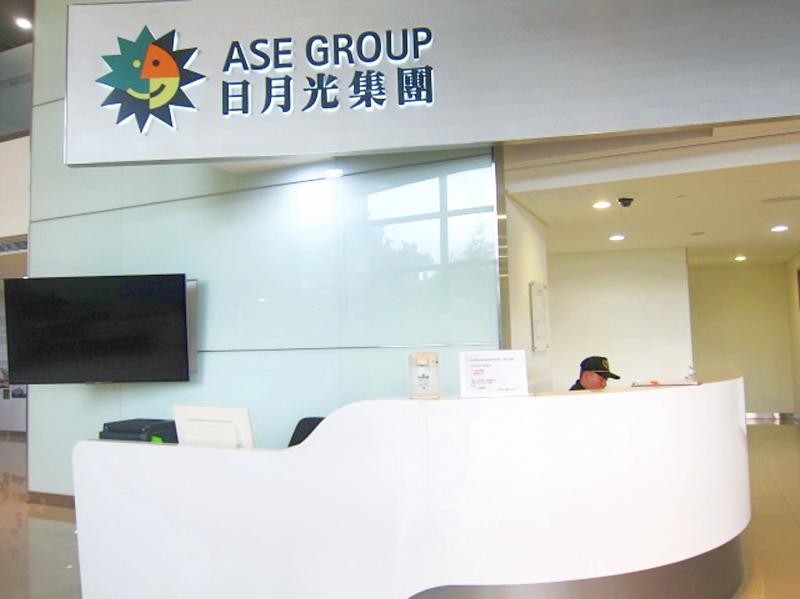ASE Technology Holding Co (日月光控股) yesterday reported that its net profit more than doubled to a record NT$14.18 billion (US$509.45 million) last quarter, as it operated near full capacity due to robust demand from the computer and communications segments.
That compared with a net profit of NT$6.71 billion a year earlier and NT$10.34 billion in the previous quarter. Earnings per share rose to NT$3.29 last quarter, compared with NT$1.57 the previous year and NT$2.4 the prior quarter.
Gross margin improved to 20.4 percent last quarter. It was 16 percent a year ago and 19.5 percent in the second quarter.

Photo: Grace Hung, Taipei Times
ASE said it expects this quarter to be “flattish,” with revenue approaching last quarter’s NT$88.79 billion, due to a shortage of wafers and substrates.
Revenue from its electronics manufacturing services (EMS), primarily its system-in-a-package (SiP) service, should increase to about NT$79.14 million from last quarter’s NT$61.12 billion, the company said.
However, the company said it would likely miss its operating profit margin target of 4 percent for the EMS business this year, due to component shortages and supply chain disruptions.
“What we are seeing is some softness in demand in certain areas, but, in general, the whole industry is still going through rapid growth,” ASE chief financial officer Joseph Tung (董宏思) told investors during a teleconference.
“Customers are seeking to secure more supply,” he said.
Factory utilization is to stay at a high level of 85 percent for its chip packaging services and 80 percent for its chip testing services, similar to last quarter’s levels, he said.
Despite noises about double booking and potential softness in end product demand, ASE said it believes there is still substantial pent-up demand.
The Kaohsiung-based company said it expects its business to continue growing next year, with a better-than-seasonal outlook for the first quarter of next year.
The company said it continues “to have strong order flows from a vast majority of our customers, with orders well extending into 2022 and some in 2023, well beyond normal booking time.”
ASE said it also expects to see a “friendly pricing environment” next year, indicating an upside for prices.

UNCERTAINTY: Innolux activated a stringent supply chain management mechanism, as it did during the COVID-19 pandemic, to ensure optimal inventory levels for customers Flat-panel display makers AUO Corp (友達) and Innolux Corp (群創) yesterday said that about 12 to 20 percent of their display business is at risk of potential US tariffs and that they would relocate production or shipment destinations to mitigate the levies’ effects. US tariffs would have a direct impact of US$200 million on AUO’s revenue, company chairman Paul Peng (彭雙浪) told reporters on the sidelines of the Touch Taiwan trade show in Taipei yesterday. That would make up about 12 percent of the company’s overall revenue. To cope with the tariff uncertainty, AUO plans to allocate its production to manufacturing facilities in

TAKING STOCK: A Taiwanese cookware firm in Vietnam urged customers to assess inventory or place orders early so shipments can reach the US while tariffs are paused Taiwanese businesses in Vietnam are exploring alternatives after the White House imposed a 46 percent import duty on Vietnamese goods, following US President Donald Trump’s announcement of “reciprocal” tariffs on the US’ trading partners. Lo Shih-liang (羅世良), chairman of Brico Industry Co (裕茂工業), a Taiwanese company that manufactures cast iron cookware and stove components in Vietnam, said that more than 40 percent of his business was tied to the US market, describing the constant US policy shifts as an emotional roller coaster. “I work during the day and stay up all night watching the news. I’ve been following US news until 3am

Taiwan will prioritize the development of silicon photonics by taking advantage of its strength in the semiconductor industry to build another shield to protect the local economy, National Development Council (NDC) Minister Paul Liu (劉鏡清) said yesterday. Speaking at a meeting of the legislature’s Economics Committee, Liu said Taiwan already has the artificial intelligence (AI) industry as a shield, after the semiconductor industry, to safeguard the country, and is looking at new unique fields to build more economic shields. While Taiwan will further strengthen its existing shields, over the longer term, the country is determined to focus on such potential segments as

COLLABORATION: Given Taiwan’s key position in global supply chains, the US firm is discussing strategies with local partners and clients to deal with global uncertainties Advanced Micro Devices Inc (AMD) yesterday said it is meeting with local ecosystem partners, including Taiwan Semiconductor Manufacturing Co (TSMC, 台積電), to discuss strategies, including long-term manufacturing, to navigate uncertainties such as US tariffs, as Taiwan occupies an important position in global supply chains. AMD chief executive officer Lisa Su (蘇姿丰) told reporters that Taiwan is an important part of the chip designer’s ecosystem and she is discussing with partners and customers in Taiwan to forge strong collaborations on different areas during this critical period. AMD has just become the first artificial-intelligence (AI) server chip customer of TSMC to utilize its advanced